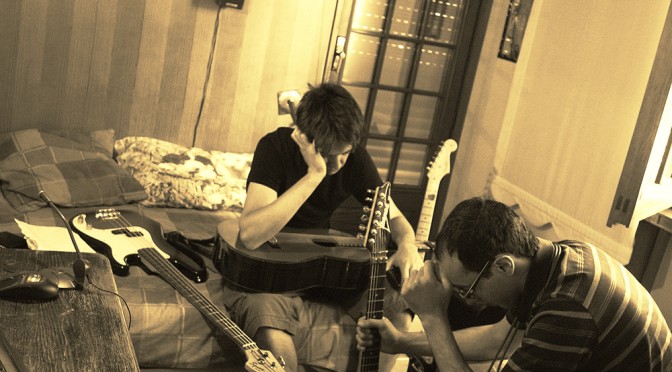
When you start playing guitar chords, it might feel like you are hitting your head on the wall. The chords are the bread and butter of playing the guitar, but they aren’t the easiest part of learning to play. Until you master them, progress can be slow and painful.
So, what are the most common problems guitarists face when playing guitar chords and how could you improve your skills?
Your Fingers Are Too Far
If your chords don’t sound the right or you are having a hard time hitting the right notes, your finger position is likely wrong. You need to pay a lot of attention in nailing the right finger positions to ensure you make the right sound.
Most beginner guitarists tend to place fingers too far from the fret. The finger shouldn’t be right over the fret, but ideally about three-quarters of the way toward the first fret of the chord.
Pressing Down the String Too Hard/Not Hard Enough
Another common problem is the way you press down the strings. If the sound isn’t right or you have trouble moving from one chord to another, you might be pressing down the string too hard or perhaps not hard enough.
In order to create the right sound, you need to press each string of the chord with the same pressure. You shouldn’t feel forced to create the pressure but you also need to make sure the pressure you apply is firm enough.
Fingers Not Stretched Enough
It might sound silly but you need to stretch and warm-up your fingers as a guitarist. Unwanted tension or inflexibility might well be the reason you struggle playing the chords.
Do some types of the finger exercises and exercise the right finger positions even without the guitar. This helps the muscles to loosen up and learn the new patterns.
Progressing Too Slowly
The reason you aren’t nailing down those chords might well be down to you not progressing quickly enough. Sounds strange? Going with a cautious approach of learning to play one chord at a time might sound like a smart move, but it could be slowing you down.
It’s important to stop focusing on just one chord, as this can slow down your brain’s learning process. If you try to practice at least three chords at a time, you are much more able to make the distinctions and create the right pathways in your brain quicker!
How To Master the Chords
The above are some of the most common problems beginner guitarists are faced with when learning chords. On top of the tips above, a few essential things can make you master chords quicker.
Try to include different sensory activities to your chord learning. As well as the actual physical practices of playing the note, make sure you also listen to others playing the chords, watch videos highlighting the right finger positions and practice with and without the guitar.
Don’t be too ambitious. Some chord progressions, such as going from G7 into a D, are not easy and you shouldn’t be stuck with trying to learn the tough stuff at the start. Find chord progressions that come naturally to you and master these before you move onto the next ones.
Overall, stay patient. You won’t learn to play the guitar overnight, but if you try different approaches and mix your guitar lessons with videos and theory, you can get there!
Are you a guitarist? Check out our full range of online guitar lessonsAre you a saxophonist? Check out our full range of online saxophone lessons
Subscribe to Pro Music Tutor from as little as £7.99 per month
Related Posts
-
The Benefits of Online Music Education
Learning music has never been easier, since the internet and modern technological advancements have opened the doors to countless possibilities, expanding the subjects people can choose from and how the lessons are taught. Now, people can study a whole host of music-related topics; from learning to play guitar or DJing, to understanding the inner workings […]
View All >> -
Essential Jazz Guitar Scales that are Easy to Learn
Improvising in jazz requires the ability to play in different keys over different chords. Results certainly do not come overnight, but with diligent practice, you would be surprised by what you can achieve. Many people ask me about what scales I use as if they were some big secret. While knowing your scales is very […]
View All >>
Latest Blog Entries
-
The Benefits of Online Music Education
Learning music has never been easier, since the internet and modern technological advancements have opened the doors to countless possibilities, expanding the subjects people can choose from and how the lessons are taught. Now, people can study a whole host of music-related topics; from learning to play guitar or DJing, to understanding the inner workings […]
View All >> -
Essential Jazz Guitar Scales that are Easy to Learn
Improvising in jazz requires the ability to play in different keys over different chords. Results certainly do not come overnight, but with diligent practice, you would be surprised by what you can achieve. Many people ask me about what scales I use as if they were some big secret. While knowing your scales is very […]
View All >>
Blog Categories
- Categories
- Guitar Tips (93)
- History (36)
- How-To (38)
- Interviews (3)
- Music Industry (121)
- Prolinks Guitar (2)
- Prolinks Lessons (3)
- Prolinks Tutor's Profile (1)
- Saxophone Tips (40)
- Uncategorized (6)
Tags
Archive
- November 2018 (1)
- February 2018 (1)
- December 2017 (1)
- November 2017 (1)
- October 2017 (1)
- July 2017 (4)
- May 2017 (2)
- April 2017 (1)
- August 2016 (2)
- July 2016 (1)
- June 2016 (2)
- May 2016 (3)

